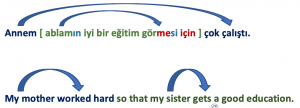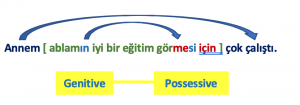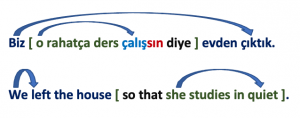Ünite 3: Sosyal Medya Kullanımı
Expressing Purpose
In this section, we will examine various purpose clauses and learn how to express purpose in Turkish. First, let’s examine purpose clauses in English:
Purpose Clause
- I woke up early (in order) to be on time at the interview.
- He went into the store to buy Turkish delight.
- She woke me up early so that I’m not late for the interview.
- I left the house so that she could study in quiet.
Purpose clauses should not be confused with reason clauses.
Reason Clause:
- I was late for the interview because I overslept.
- He didn’t stay long since it was getting late.
There are several ways you can express purpose in Turkish. The following are the most frequent purpose clauses you can find in the language:
- -mAk için clauses
- -mA+Possessive için clauses
- Verb+Optative diye clauses
Below we will examine the structure and function of each of these.
Aktivite A: İnceleme, -mAK için
One way to form purpose clauses is to use the infinitival marker -mAK along with için ‘for’. Let’s examine the sentence Ben çalışmak için kütüphaneye gittim, which translates as I went to the library to study:

This sentence consists of both a main clause and an embedded clause. The main clause is Ben kütüphaneye gittim, which translates as ‘I went to the library’. The embedded clause is the clause that contains-mAK için, namely çalışmak için, the English of which is ‘to study’. The embedded/-mAK için clause cannot contain within it an overtly expressed subject—just as is the case in English. The subject of both the embedded clause as well as the main clause is understood to be Ben ‘I’. In other words, Ben is the one who goes to the library as well as the one that aims to study.
Below are some examples. Examine and discuss them with your instructor.
- Müge dinlenmek için odasına geçip müzik dinledi. Müge went into her room and listened to music in order/to relax.
- Biz sağlıklı kalmak için düzenli olarak spor yapıyoruz. We exercise regularly so as to/ to stay healthy.
Aktivite B: İnceleme, -mA+Possessive için
This construction is similar to the -mAK için construction but is used in cases where the subject of the embedded clause differs from that of the main clause. Examine the following sentence: Annem ablamın iyi bir eğitim görmesi için çok çalıştı. This translates into English as ‘My mother worked hard so that my sister gets a good education.’
 The subject of the -mA+Poss için embedded clause is ablam ‘my sister. This subject is different from the subject of the main clause, which is annem ‘my mother’. We further see that the embedded clause features a genitive-possessive construction, with the subject ablam ‘my sister’ receiving the genitive case and the verb+mA cluster receiving the possessive marking that agrees with this subject.
The subject of the -mA+Poss için embedded clause is ablam ‘my sister. This subject is different from the subject of the main clause, which is annem ‘my mother’. We further see that the embedded clause features a genitive-possessive construction, with the subject ablam ‘my sister’ receiving the genitive case and the verb+mA cluster receiving the possessive marking that agrees with this subject.

Examine the sentences below and discuss them with your instructor.
- Ben [ senin seçilmen için ] çok uğraştım.
- O [ benim rahatça ders çalışmam için ] evden çıktı.
- Anneannem [ (bizim) üniversite sınavlarında başarılı olmamız için ] sürekli dua ediyor.
Aktivite C: İnceleme, Verb+Optative diye
The subordinator diye is derived from the verb de– ‘say’. It has many functions, one of which is to express purpose. When used as part of a purpose clause, diye must follow a verb in the optative mood.
Let’s examine the sentence Biz o rahatça ders çalışsın diye evden çıktık, which translates as ‘We left the house so that she studies in quiet’.
 In verb+optative diye clauses, we see that the embedded diye-clause has a verb in the optative (çalışsın diye) that agrees with the subject o. Note that the subject in this embedded clause (o) is different from the one in the main clause (biz). Additionally, the subject of the diye–clause is in the regular nominative.
In verb+optative diye clauses, we see that the embedded diye-clause has a verb in the optative (çalışsın diye) that agrees with the subject o. Note that the subject in this embedded clause (o) is different from the one in the main clause (biz). Additionally, the subject of the diye–clause is in the regular nominative.
Examine and discuss the following examples of verb+optative diye clauses with your instructor:
- O [ sen üzülmeyesin diye ] sana gerçekleri söylemedi.
- O [ bize yardım etsin diye ] Mete’yi çağırdım.
- Annem [ biz acıkmayalım diye ] bir sürü yemek yapıp göndermiş.
As mentioned above, when diye is used with verb forms other than the optative, it will not indicate purpose. Examine the following sentences where this is the case:
- Tunç [ sen onu davet etmedin diye ] çok üzülmüş.
- Tunç got upset [ because you did not invite him ].
- Ben [ yağmur yağacak diye ] yanıma şemsiyemi aldım.
- I took my umbrella [ because it will rain ].
In the examples here, the verbs in the embedded clauses have tense marking. These embedded clauses headed by diye are not purpose clauses but reason clauses instead.
The subordinator diye has many functions, which we will explore in the units ahead.
Aktivite Ç: Tartışma
Below are the sentences from the reading that indicate purpose. Examine and discuss them with your instructor.
- Her gittiğimiz yerin, konserin, etkinliğin fotoğrafını çekiyoruz, “Oradaydım!” diyebilmek için.
- Biraz daha büyük resmi görebilmemiz için, genç, parlak ve bu konuda bilgili bir sosyal medya stratejisti ve analisti İlter Özekici’yle konuştum.
- Her platform, kullanıcıya daha iyi bir deneyim sağlayabilmek için, algoritmaları devreye sokuyor.
- Sosyal medyada (Instagram’da, Twitter’da, Facebook’ta vs) biraz daha vakit geçirelim ve markalarla iletişime geçelim diye!
- Her şey, aslında markalar reklam versin diye mi?
- “Markalar reklam versin ki platformlar para kazansın!” diye.
Aktivite D: Konuşma
Siz aşağıdakileri gerçekleştirmek için neler yapıyorsunuz? Önce yanınızdaki kişiyle, sonra da sınıfınızla konuşun.
Örnek:
Ben dinlenmek için şiir okurum.
| Dinlenmek | Eğlenmek | Eğlenmek |
Aktivite E: Cümle Birleştirme
Cümleleri birleştirin. Bazen -mAk için, bazen de -mA+Poss için yapısını kullanmalısınız.
Örnek:
- Ben iyi bir vakit geçirmek istedim. Arkadaşlarımla buluştum.
Ben iyi bir vakit geçirmek için arkadaşlarımla buluştum.
- Eşim süphelenmesin. Sürpriz doğum gününü hazırlarken çok dikkat etmeliyiz.
- Arkadaşımın maçı kazanmasını istiyorum. Biz onu desteklemeye gideceğiz.
- Annemin nasıl olduğunu öğrenmek istiyorum. Bu akşam annemi arayacağım.
- Yarınki toplantıya gitmek istemiyorum. Bahane uyduracağım.
- Sen şirketten ayrılma. Ben maaşına zam yapacağım.
- Patron bizim grev yapmamızı istemiyor. Patron bize baskı yapıyor.
Aktivite F: Cümle Tamamlama
Aşağıdaki durumlarda neler yaparsınız?
Örnek:
- Ben her sabah geç kalmayayım diye ____
Ben her gece, geç kalmayayım diye alarm kurarım.
- Ailem üzülmesin diye _____
- Arkadaşım köpeği acıkmasın diye ____
- Öğretmen çoçuk ağlamasın diye ____
- Ev arkadaşım ben arkadaşlarımı eve çağırmayayım diye ____
- Arkadaşlarım hep birlikte Bordum’da tatil yapalım diye ____

